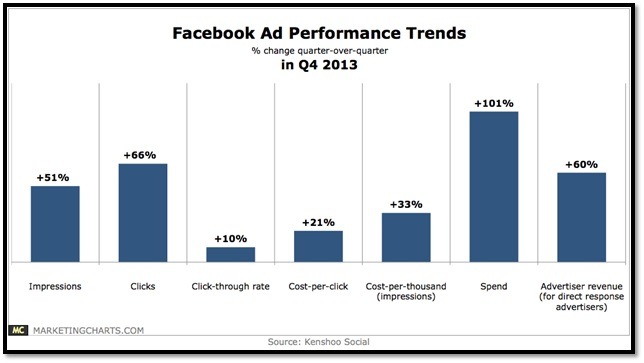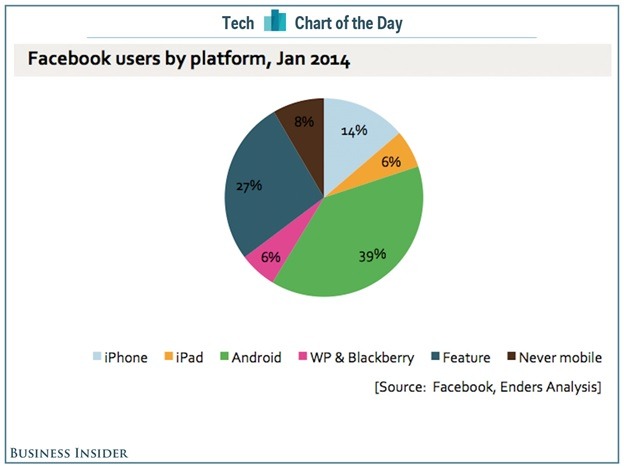The worst thing about being on the receiving end of a lot of data is that it often conflicts with itself, making it even more challenging to get our collective heads around what’s really happening.
You’d think that with a monolith the size of Facebook, its long-term status might look pretty clear. But while the future may be impossible to predict, even understanding the present can be challenging.
 That dilemma may have reached a “water cooler” high point last month when a group of Princeton academics predicted that Facebook would lose 80% of its customer base between 2015-2017.
That dilemma may have reached a “water cooler” high point last month when a group of Princeton academics predicted that Facebook would lose 80% of its customer base between 2015-2017.
Using infectious disease models to prove their point, Time reported that researchers from the university’s Department of Mechanical and Aerospace Engineering believe Facebook will experience a rapid decline due to a lack of interest that will spread to peers. And you can guess how it will all end up – a social media epidemic on a scale even more devastating than what befell MySpace.
Of course, these researchers aren’t sociologists or even technologists. And while we all hear anecdotal stories about Facebook’s demise – especially among teens – this is why we do our own research, thanks to hundreds of you and thousands of your listeners.
We addressed this issue head-on, taking a deep dive into Facebook in Techsurvey10. That survey is wrapping up as I write this post, already generating well more than 40,000 responses. Glancing at the “early returns,” I can tell you that we’re not ready to start sitting shiva or scheduling a wake for Mark Zuckerberg and company. But the questions related to how the monster of social networks is holding up, whether its habit-forming quality is on the decline, and how consumers are using the platform in 2014 are good ones that we address in this year’s survey.
This last point is especially important because while radio has been quick to jump into Facebook (relatively speaking, and hey, it was free), mavens like Lori Lewis will tell you that most broadcasters don’t really understand why consumers use Mark Zuckerberg’s playground in the first place. That’s another reason why TS10 asks Facebook users to tell us the main reasons why they spend time there in the first place. When we understand behavioral motivation, we can better devise strategies and tactics that are designed to optimize our efforts there.
I will leave you with two other pieces of data about Facebook that may – or may not – give you some food for thought. Or at least something to talk about at parties or jocks meetings.
First, audience performance trends are looking pretty damn good, according to Kenshoo. From impressions to clicks to overall spend, there is a lot of “thumbs up” metrics in this chart:

And then, there’s the mobile piece. We know that brands big, small, and global are all focused on keeping up with the mobile revolution. So how is Facebook doing in this department?
Here’s a chart that depicts the speed at which Facebook usage is moving away from computers and to mobile phones of all varieties – from “feature phones” to Android, iOS, and other platforms:

You can read a great deal into several of these “pie slices,” but the one that may be most meaningful is the 8% who say they never access Facebook on a mobile device.
Only 8%.
That’s a strong indication that while Facebook may have had serious mobile issues just a couple of short years ago before the IPO launched, they are moving millions and millions of users to mobile.
And today, take a moment to wish Facebook a happy 10th birthday. And my how its grown! Because Facebook no longer has 1 billion users – newly released data shows the “social network” at 1.23 billion people globally.
So you make the call – is Facebook in trouble with an incurable disease? Or is Facebook getting stronger by increasing engagement, advertising metrics, and mobile usage?
Stay tuned for Techsurvey10 results that are geared toward helping radio figure it out.
And for an alternative Onion-like reinterpretation of the Princeton research from Facebook, click here.
- For Radio, Will It Be Christmas In April (And Hopefully, May)? - April 21, 2025
- Media And Technology In 2025: Believe It Or Not! - April 18, 2025
- In Radio, You Just Never Know - April 17, 2025




Good article, well balanced on your view of Facebook. I, unfortunately find it hard to be balanced… I just loathe Facebook (but hey, that’s what makes horse-races). I deleted my account (well, as much as they would let me delete it) literally years ago). But that’s another story.
This is interesting to note. Taken from Slashdot this morning regarding the Facebook earnings report:
“Last week, during its fourth-quarter earnings report, Facebook revealed it had 1.23 billion monthly active users, 757 million daily active users, 945 million monthly active mobile users, and 556 million daily active mobile users. In its 10-K filing published on the weekend, the company estimated that in 2013, between 5.5 percent and 11.2 percent of these users were fake.”
https://thenextweb.com/facebook/2014/02/03/facebook-estimates-5-5-11-2-accounts-fake/
This is the first time Facebook has ever acknowledged the existence of “fake” accounts on the social media site. Kind of begs the question, if they are admitting that possibly 10% or more of the accounts aren’t “real,” could the actual number be higher? If you take into account developer test accounts, (multiple) accounts that users created and abandoned, other shadow profiles, pages for your cat, etc… it undoubtedly is much higher.
Not to mention the Facebook pages for family pets, too! Thanks for the comments, John. Even with “fake” accounts and other oddities, it’s still a juggernaut to be reckoned with.
Like all tech phenomena, its not a question of if Facebook will run its course but when. Maybe by 2017, maybe earlier and maybe later. By typical standards, Facebook has already had a long life – its 70 in dog years and much older than that in tech years.
It seems that they’ve figured out the monetization part just as the youngest users have decided that they don’t want to be on a platform with their moms and all of their accompanying pet pics and exclamation points. My limited anecdotal read is that kids have moved on to Snapchat, Groupchat, Instagram and other platforms and 20-somethings while still on Facebook are focused on Instagram and Twitter. Lets face it – its hard to be relevant to someone if its also relevant to their parents. I’ll be interested to see if the latest TechSurvey reflects my unscientific sense of things.
Full disclosure – I have a fake Facebook page – I use it when someone requires that I log in via Facebook and I don’t want to share my personal info with them. I created it when iHeart radio was first released and insisted that you log in with Facebook. I have a profile picture, DOB, POB and even pics of this fake person’s parents. Clearly, I need more to do.
Your inclinations are correct that our limited Gen Z sample and more robust Gen Y group will be showing signs of moving on to other platforms. As adults do more and more, they co-opt kid things from Facebook to Halloween. Fortunately, they now have options and we will continue to track them. And your disclosure about a fake account is interesting, and makes you wonder how many of these are actually in existence. Thanks for commenting, Bob.
Hi Fred! Great post as always. I was wondering if you had thoughts about the Business Insider chart you posted – a colleague shared that with me as well and I personally found it to be deceptive. From what I could gather, it only shows if on mobile, what platform do you use – so it does not take into account desktop. Desktop isn’t even on the chart. What if I use Facebook on desktop as well as a mobile phone? That is not indicated.
Did you find it a little bit misleading as well? Would like your thoughts.
I forgot to mention – couldn’t agree with you MORE on the power of mobile, mobile-first, and how that will only grow…
Yes, it’s one of those charts that takes a few minutes of staring. It’s not a mobile to desktop comparison, but shows people who use those devices to access Facebook.
And to your second point, it’s all part of the ongoing mobile explosion. Exciting times. Thanks for the kind words, Emily, and hope all is well.